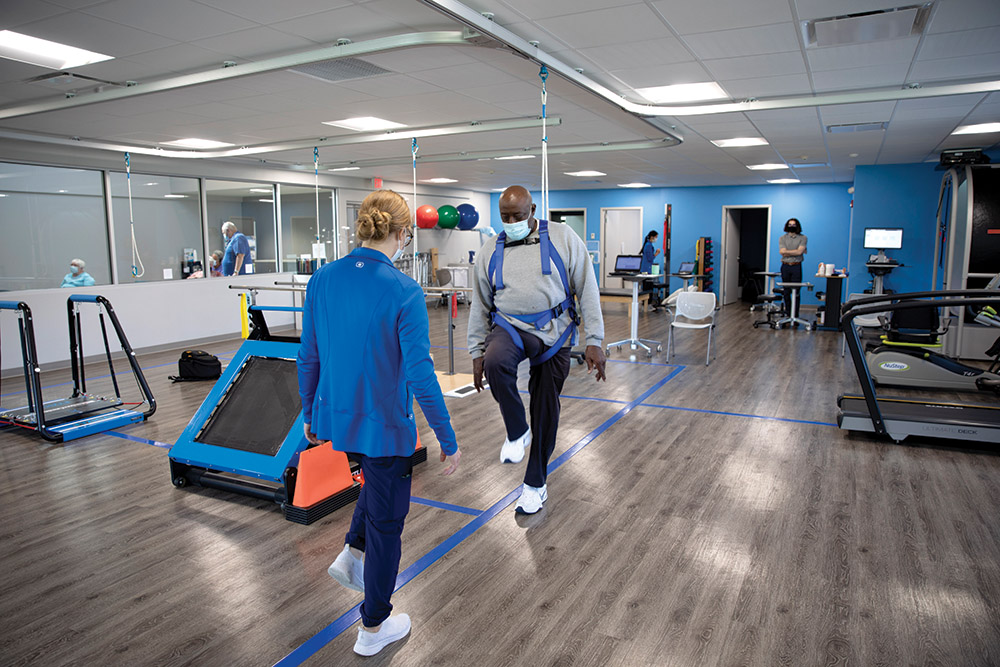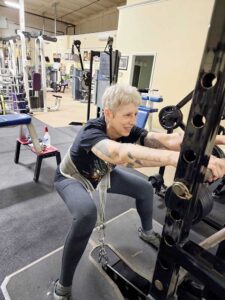By Alexander Germanis
With the autumn inevitably comes increased hours of darkness. One of the most pleasant ways to pass time during the ever-lengthening evenings is by listening to music.
What few people think about when listening to their favorite tunes, however, is the important role balance plays in music. From the proper number of instruments in an orchestra to the equalization of respective sound levels in a recording to the proper alignment of key components in or the proper placement of stereo equipment, balance is necessary for music to be properly played, heard, felt, and enjoyed.
While moving about in one’s environment—be it one’s home, the store, or going for a walk in around one’s neighborhood—balance is a key component in having an enjoyable and safe time. For those who might need a little help getting back “in tune” with moving around safely, the FYZICAL Therapy and Balance Center of Peoria is there to help.
Everything in the Right Place
An orchestra is laid out in a very specific way for the purpose of balance. The softer strings and woodwinds are arranged in front with the more bellicose brass behind them, with percussion along the back. This is so, to the listener, no section accidentally overpowers the rest. Rearrange the seating and the orchestral balance will be off.
FYZICAL’s Physical Therapy Assistant, Bethany Wagenbach, says there are some indicators that will tell you if your “orchestra” may be misarranged. “A person should consider getting their balance checked if they have a fall, a fear of falling, or notice that daily activities have become harder to perform in terms of balance,” she states. “Balance issues are good for seniors to be aware of.”
A standing test and functional gait test are two such methods therapists use to determine if there may be a problem. “The standing test assesses one’s ability to maintain balance on both a static and moving surface in different visual scenarios, including eyes open, eyes closed, and visual conflict,” Bethany explains.
Visual conflict involves moving lights projected on the wall to mimic situations in which you may be static, but objects are moving around you. The projected lights act responsively, meaning they move as you move, which might result in dizziness or imbalance.
“The functional gait test assesses balance with various walking activities such as navigating obstacles, walking backward, walking with eyes closed, turning around, and navigating stairs,” Bethany continues. “Each test serves a different purpose, and all tests are important to better understand the individual person.”
Producing the Right Results
There’s a good reason why musicians aren’t the only ones who win music awards. The producers and engineers are responsible in making sure any recording sounds as good—and in some cases better—as if you were listening to a performance in person. Recording levels shift constantly during a recording session, so proper levels must be kept in control throughout the course of recording.
Our vestibular system—the body’s system of balance and spatial orientation—can be just as sensitive to shifts, so the need for an individualized approach to sorting out balance issues is most important.
“The frameworks that are used to test and subsequently treat each patient are what makes FYZICAL’s approach to vestibular therapy different than others,” Bethany says. “FYZICAL has specific progressions set up for each patient depending on the results of their balance tests.”
These tests will determine what a patient’s strengths and deficits are and those results will then inform the conditions upon which the patient will progress through their goals and according to their personal needs.
“Any sort of balance therapy can be effective,” Bethany points out, “but having a cohesive plan backed by research for the patient is the most efficient and most effective.”
More Ways than One
A variety of factors can alter one’s enjoyment of good music. The space in which one is listening, the fidelity of one’s stereo equipment, or even the health of one’s hearing. Not everyone’s circumstances are the same. The end goal, however, is.
Our balance can be affected by myriad factors as well. “Factors can include decreased strength, numbness/poor sensation, abnormal posture/gait, vestibular weakness or vestibular loss, and lack of or poor vision,” Bethany outlines. “Significant hearing loss or a sudden loss of hearing can also most certainly affect balance. However, getting a hearing aid generally helps to address this. So, quite often the physical therapists at FYZICAL-Peoria work closely with the doctors of audiology and the medical physicians at Peoria Ear, Nose, and Throat Group in developing a holistic solution to the patient’s individual balance needs.”
The list continues with injuries both prior and current, obesity, a decreased range of motion or mobility, decreased strength, arthritis, and pain.
And of course, with increased age comes a decrease in bone density, sometimes resulting in the condition known as osteoporosis. Decreased bone density increases not only the likelihood of a fall, but also adds to the chances of serious injury resulting from a fall.
Based on the results of the tests and each patient’s personal tolerances, FYZICAL therapists tailor specific exercises to address the patient’s areas in need of fine tuning. For cases of osteoporosis, low-impact strength training and weight-bearing aid to lower the risk of injury. “For the majority of patients with osteoporosis, their treatment may vary slightly compared to a similar patient without osteoporosis,” Bethany adds, “but the general goals and guidelines will be the same.”
The Sweet Sound of Standing Strong
Like attending a concert or sitting back with an album playing, both the colder months and the years of retirement should be times to be enjoyed. Removing the insecurity and uncertainty of imbalance is what FYZICAL Therapy and Balance Centers help you accomplish. They are looking forward, with you, to a No-fall Fall.
Like the best musicians, engineers, and producers, the therapists at FYZICAL will help you find, regain, and maintain your proper balance so you and whatever music you may enjoy can be in perfect harmony with your surroundings.
FYZICAL Therapy & Balance Center is located at 6809 Knoxville Avenue in Peoria, Illinois. If you are suffering from dizziness or vertigo, imbalance, or have a history of falls, please contact us. To make an appointment, please call us at (309) 981-8810 or visit us online at www.fyzical.com/peoria.
For additional informative and inspirational articles, visit 50 Plus News and Views Greater Peoria Area online edition today.










